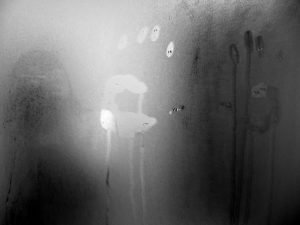When the bus drops Diana off in the afternoon, her mother is still at work. She lets herself into the silent, spotless apartment, a large box of Oreo cookies and two bags of Mounds in her embrace.

Amy. CC license.
Dropping her heavy backpack, she heads for the bathroom, embarking on a rigid routine from which she never wavers, not in the minutest detail. She strips and dumps the austere British School uniform into the laundry basket. The undergarments, all in pink, a child’s color, are tossed in next. Then she takes a hot shower, soaping herself over and over again, and washes her hair exactly three times. The bathroom mists up from her hour-long shower.
She puts on a pair of clean jeans, a fresh T-shirt, and a pair of clean white tennis socks. She clips her fingernails. Deanie likes to wear purple or blue or gold nail polish on her extremely short nails that look as though they’ve been bitten to the quick. There are traces of her nail polish on the tile-covered dining table, dabs of pink and touches of glittering blue.
Pink brush in hand, Diana goes into her immaculately clean room where every item in every drawer is neatly organized. Her many stuffed animals sit in their precisely designated places. Their positions cannot be changed. She has given them all special names—Georgie the Pilot, Snowball, Chuck the Moth, and Petey and Patty. Snuggle Bear sits along beside them on top of the closet, wearing a navy t-shirt that says: “Snuggle Up with Someone from Stony Brook.”
Alone in her room, Diana hesitates. Looking at the framed photographs arranged on the glass shelf above her desk, she selects a frame with a photograph of herself at twelve, just a year before her parents divorced and her life splintered into shards of broken glass. She is with her best friend from Rockland Middle School. They are clowning around in the basement, and the expression on their faces is happy. She wanders off to the living room, looking at the ethnographic objects on display. She selects a heavy brass leg bracelet from Zaire and bangs the frame, breaking the glass. Picking up the pieces carefully, she places them in a Ziploc bag and hides the bag beneath the delicate pink blouse her mom bought in a shop across the street two days ago. Then she goes to the living room, turns on the TV, and begins eating her candy.
Ann comes home from work about an hour after the bus drops Diana off. She knows that her child detests the haphazard meals—the overcooked vegetables, undercooked rice, and tasteless hamburgers—that she prepares in haste. When they sit down to eat and Ann asks her about her day, Diana says little. She takes a few bites and says, “I’m done.” Aligning the books on the coffee table, she turns on the TV. The brush, hand cream, and lip balm are next to her on the sofa. Ann begins clearing up the dishes. “The floor is dirty,” Diana calls out from the sofa, although it has been mopped the day before. Ann is extremely fastidious in keeping the apartment clean. She gets the mop and detergent out and washes the floor again.
Clearing away another uneaten meal from the dining room table, Ann says: “Deanie, turn the TV off. We have to talk.” “Leave me alone, Mom! I’m tired,” Diana responds. And Ann knows that this is true. On weekdays, her daughter sleeps an average of two or three hours a night. No matter how exhausted she is, she is incapable of falling asleep before four or five a.m. Every Saturday and Sunday is the same. Ann begins her attempts to wake Diana up at eleven. Enveloped in her large comforter, Deanie mutters: “Just one more hour…” Ann goes back in at noon and continues going in every hour until late afternoon. She wants Deanie to get up early, hoping—even though she knows it won’t work—that she’ll be able to fall asleep early the following night. She knows that Deanie is so tired that she could easily sleep through a twenty-four-hour stretch. And so it goes as she steps in every hour, coaxing her child from her deep slumber into the receding day.

Holger Lückerath. CC license.
Diana describes herself as nocturnal. Although she is a quiet child, it’s at night, when she cannot sleep, that she confides in Ann and tells her her worries. “Mama?” She calls out. It is a tentative call. Desperate for sleep, Ann buries her face in her pillow to escape it. “Mama? Mama? Mama?” comes the questioning call. There is no escaping it. Ann gets up. She sits by her child’s bed, smoking and listening. She chain-smokes, and sometimes she moves out into the hall and sits on the floor from where she can see Deanie, and listens, the worries and fear and sadness spilling out as the raindrops tap-tap-tap on the windows in the silent Cologne night.
“Mom, I’m worried.” This is how Diana always begins. She is running her hairbrush through her hair again. “What are you worried about, sweets?” Ann asks. “The art teacher’s so mean, Mom. She keeps telling me I’m working too slowly.” Ann has spoken to the art teacher, Mrs. Bamber, and explained why Diana cannot work more quickly. Deanie is an excellent artist but as soon as she draws a few lines, she erases them and starts again. The drawings are never good enough. And so she spends hour upon hour trying to make them perfect.
‘I’ll talk to Mrs. Bamber, sweets,” Ann says in an attempt to comfort her. “And the girls don’t talk to me anymore,” Diana goes on. “When we go to class, I just tag along behind them. Mom, I tried to be the nice one. But even that didn’t work.” She is crying, something she seldom does and only at night, when she calls out to Ann. Ann knows that her child is becoming more and more isolated at school. She knows that Diana desperately wants to fit in, but she doesn’t know how to help her. Ann has called up Diana’s classmates twice and asked them, awkwardly, if Deanie could join in their activities. Their response was friendly and they invited Diana out. But then, Ann thinks, they forgot about her, because Diana, timid as she is, is always receding into the background.
And so it goes, night after night, a mother trying to guide her wounded child through the debris of their shattered lives.
On the third Thursday of each month, the two take a tram to the office of Diana’s psychiatrist. Diana has to leave school early and catch a train from Rodenkirchen to Cologne. Nowadays she is afraid of most things and the train ride scares her, even though it’s perfectly safe. The two meet each other at the tram station in town.
Ann has been trying, unsuccessfully, to persuade the psychiatrist Diana has been seeing for over a year to increase her dose of clomipramine. He always gives her an emphatic “no,” saying that this is the dosage prescribed for adolescents. Diana’s obsessions are becoming more elaborate. It takes Ann some time to catch on that an innocent gesture is actually a new ritual. One day, Ann notices a pile of clean white socks in the laundry basket that she emptied that morning to do the wash. “Why are you changing your socks? They’re clean.” Deanie smiles: “They feel dirty.”
They enter the psychiatrist’s spacious office. Ann always wonders about the absence of medical books. Does he keep them at home? Diana sits at the table, head slumped in her arms, without saying a word. “Look,” Ann tells the psychiatrist angrily, raising her voice, “she’s suffering from depression. You have to put her on an anti-depressant.” He looks at Ann calmly, his blue German eyes impassive and indifferent. He has confronted her anger before. “No, she’s not depressive,” he says as Deanie, somnolent and unresponsive, rests her head on the table. Ann and Diana walk back to the tram. “It’s okay, Mom,” Diana says. “Please don’t cry.”
The following evening, Ann tries again: “Kid, we have to talk about the GCSEs. They’re coming up. Are you getting ready for the exams?” She doesn’t have a clue about what kind of exams the GCSEs are; she just knows that the exam papers are sent off to Britain to be graded and that the British School is much more difficult than American schools. Graduates accepted by U.S. universities get to skip their freshman year.
“Don’t bug me,” Diana says, “I’m doing my work.” “Yeah, but are you preparing for the final exams? You only have six weeks left!” And there are ten incredibly difficult exams looming ahead. Ann has heard this from other parents, but even so, she has done nothing to help her child to prepare for the exams. Diana has always excelled at school in the U.S., so Ann takes it for granted that she will be able to handle her work at the British School. It is just easier for her to think this way; getting her job done and doing the house chores is just about as much as she can handle.
Diana ignores her and continues watching Friends. She keeps rubbing hand cream into her hands and every few minutes, her brush flutters through her hair. She reapplies lip balm. Ann pours herself a very large glass of cheap Spanish wine and starts shouting, thankful that the upstairs neighbor is not at home: “You have to begin working, kid. You’re running out of time! I can’t stand this anymore. Why can’t you fall asleep at eleven? Then you wouldn’t be so tired! Deanie, there is no more time left! You have to start preparing!”
She knows that the louder she shouts, the further Diana withdraws. She cannot stop. And then she remembers what she saw the day before. “When I was putting your clothes away, your drawer was full of candy wrappings. What are you doing, Deanie? You have to stop eating this junk. You’re gaining more and more weight. Where did the candy come from? Are you taking money from my bag?”
Ann is so angry that she gets up and shakes Diana violently. “You’re crazy!” Diana yells. She gets up, picks up an old rice container from the Far East and flings it, full force, at the glass bookcase. Miraculously, nothing is broken. Bouncing off the bookcase, the container falls to the floor, leaving a small dent in the parquet floor. Ann is still shouting as Diana goes into her room and locks the door. She feels as if all sense of control has slipped vanished from her life. Exasperated and drained, she downs another glass of wine so she can fall asleep. She wants to forget everything, including work, where she can barely keep up. Her concentration is rapidly deteriorating and she is functioning on autopilot.

Jason Horne. CC license.
When Ann wakes up, Diana is in her bedroom, ironing her uniform for school. All her attention is concentrated on the ironing. She has her hair up in an odd ponytail which juts out like a unicorn’s horn, the hair imprisoned in a coil of tightly wrapped hair bands. Not a single strand of hair is free. The brush is now idle. It often takes her over an hour, and sometimes close to two, to iron the three items of clothing she will wear to school the next day. Every night Ann offers to iron her uniform for the next day, and every night her offer is rebuffed. The clothes have to be ironed to perfection. Ann wants to explode from the frustration of watching Diana perform her futile, repetitive actions. The desire to help and protect her child rapidly alternates with anger. She cannot grasp that Diana is unable to escape her rituals. She wants the child she once had back and there is nothing, not a single thing she can do, to recover or reclaim her. “It’s all your fault,” Diana sometimes tells her. “You ruined it all. I miss my dad!” “I know you do,” Ann says, pushing her feelings of guilt back into the pit of her stomach, into the hollow space of her despair.
Ann goes back to the living room and downs two more glasses of red wine. There is nowhere to go, so she returns to her room in a stupor. All she wants to do is to sleep.
When Diana no longer hears her mom walking about, she opens her closet and pulls out her Ziploc bag, hidden under her the dainty pink top from La Biscotte that will never be worn. She selects a sharp shard of glass, and thrusts it into her thigh. Blood spouts from the wound, staining the bed sheets. She makes deep gashes in her arms. She sits on the bed and methodically makes one incision after another, never uttering a sound. In the silence, the rain taps soothingly in the darkness of the cold Cologne night.

Share this post with your friends.

